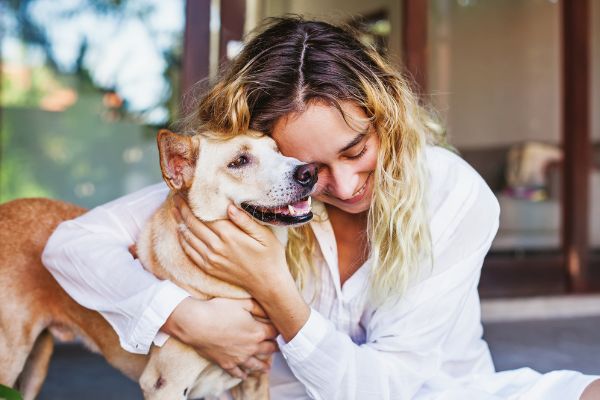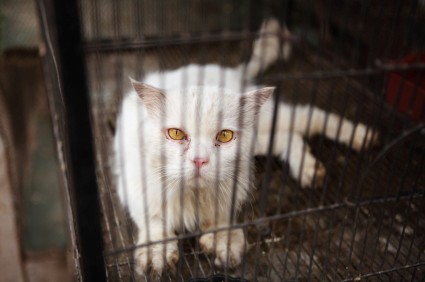
It’s a very sad topic, but one that needs to be discussed – violence and abuse towards humans and animals often occur together.
People who abuse animals are five times more likely to commit violent crimes against humans, according to a study by the Massachusetts Society for the Prevention of Cruelty to Animals and Northeastern University.
Another way of putting that: an abused animal may also indicate there is other abuse happening in the family.
Sometimes pets can be used by batterers to intimidate or control family members. More than half of pet-owning women entering women’s shelters report that their batterer had injured, maimed, killed or threatened family pets for revenge or to psychologically control victims; one-third reported their children had hurt or killed animals.
Prevalence of Animal Abuse and Neglect
While the bond between animals and humans has certainly evolved over the years, animal abuse and neglect is unfortunately still a very real problem.
Approximately 6.9 million animals are abused or neglected in the United States each year. Of these, an estimated 1.5 million animals are killed as a result of abuse.
Approximately 53% of veterinarians have treated cases of animal abuse in their practices, reports the American Veterinary Medical Association (AVMA).
The 4 most common forms of animal abuse
1. Physical abuse:
This includes hitting, kicking, biting, or other forms of physical violence.
2. Neglect:
This includes failing to provide an animal with food, water, shelter, or veterinary care.
3. Abandonment:
This includes leaving an animal alone and without care.
4. Sexual abuse:
This includes forcing an animal to engage in sexual activity.
Spotting animal abuse
Animal abuse is not limited to households that experience domestic violence, and animal abuse can be extremely difficult to spot, even for the trained veterinary eye.
Here are some signs that could indicate animal abuse:
Physical injuries.
Look for any signs of physical injury, such as open wounds, broken bones, burns, cuts, or bruises. These injuries may be the result of physical abuse, such as beating or kicking, or they may be the result of neglect, such as being left outside in extreme weather conditions.
Poor health.
An animal that is being abused may be malnourished, underweight, or have signs of illness, such as fleas, ticks, or mange. These health problems may be the result of neglect, such as not being provided with adequate food, water, or shelter, or veterinary care, or they may be the result of physical abuse, such as being hit or kicked.
Behavioral changes.
An animal that is being abused may exhibit behavioral changes, such as being withdrawn, aggressive, or fearful. These behavioral changes may be a sign that the animal is in pain or is feeling threatened.
Abandoned or neglected animals.
An animal that is tied up outside without food or water, or an animal that is living in a filthy environment, may be a sign of abuse or neglect.
Isolated animals.
Animals who are not allowed to interact with other animals or people are more likely to be abused.
Rough handling.
Animals who are being abused are often handled roughly or aggressively.
Veterinarians may suspect abuse if a pet is brought in repeatedly because of trauma, has evidence of old injuries or unreported healed fractures, or has injuries that do not seem to fit with the explanation that the owner provides. Veterinarians are obligated to report abuse to authorities.
Services for animal victims of domestic violence
Concern for the safety of their pets can be a barrier to people leaving abusive relationships.
More than 48% of victims delay leaving an abuser because they have no safe place for their animals, according to Sheltering Animals of Abuse Victims (SAAV).
To remove that obstacle, an increasing number of shelters are partnering with animal shelters, animal rescue groups, and veterinarians to provide foster care for the animal victims of domestic violence.
The American Humane Society reports there are more than 160 “safe haven” programs for pets around the United States.
 These programs provide a variety of services, including:
These programs provide a variety of services, including:
Pet-friendly shelters:
Some domestic violence shelters allow pets to stay with their owners. This can be a lifeline for victims who are afraid to leave their abuser because they don’t want to leave their pets behind.
Pet boarding and foster care:
Some organizations offer pet boarding services and/or foster care for victims of domestic violence. This can be helpful for victims who need to stay in a shelter for an extended period of time.
Financial assistance:
Some organizations provide financial assistance to help victims of domestic violence pay for pet-related expenses, such as boarding, food, and veterinary care.
Legal assistance:
Some organizations provide legal assistance to victims of domestic violence who are seeking restraining orders or custody of their pets.
Support groups:
Some organizations offer support groups for victims of domestic violence who have pets. These groups can provide a safe space for victims to talk about their experiences and get support from others who understand what they are going through.
Organizations for animal victims of domestic violence
Here are some of the organizations that offer programs for animal victims of domestic violence:
RedRover – https://redrover.org/ – RedRover is a national nonprofit organization that provides emergency assistance to animals and people affected by disaster, cruelty, neglect, and abandonment. RedRover also offers a number of programs to help victims of domestic violence keep their pets safe, including Safe Escape Grants, Safe Housing Grants, and the Purple Leash Project.
Sheltering Animals of Abuse Victims (SAAV) – https://www.saavprogram.org/ – SAAV is a national nonprofit organization that provides pet-friendly shelter and support to victims of domestic violence. SAAV also offers a number of programs to raise awareness about the link between animal cruelty and human violence.
The Humane Society of the United States (HSUS) – https://www.humanesociety.org/ – The HSUS is a national nonprofit organization that works to protect all animals from cruelty and neglect. The HSUS offers a number of programs to help victims of domestic violence keep their pets safe, including the Pets for Life program.
The American Society for the Prevention of Cruelty to Animals (ASPCA) – https://www.aspca.org/ – The ASPCA is a national nonprofit organization that works to prevent cruelty to animals and to provide effective means for the prevention of cruelty to children. The ASPCA offers a number of programs to help victims of domestic violence keep their pets safe, including the ASPCA Animal Poison Control Center and the ASPCA Pro Bono Program.
If you are a victim of domestic violence, please know that you are not alone. There are many resources available to help you and your pet.
Services for victims of violence
If you are a victim of domestic violence and you are concerned about the safety of your pet, there are a number of confidential resources available to help you.
Please seek help immediately by calling the National Domestic Violence Hotline at 1-800-799-SAFE (7233).
If you suspect animal abuse or neglect, report it to local animal control officials.
In Seattle, learn more about what constitutes legal animal cruelty.
If you are concerned for the welfare of an animal, contact Seattle Animal Control at 206-386-PETS (7387), or visit their website.
If you have a life-threatening situation involving both humans and animals, please call the Seattle Police Department at 911.
You can also report suspected abuse to a humane society or to your state’s cruelty hotline.
Contact your local domestic violence shelter or animal welfare organization to learn more about programs available in your area.



